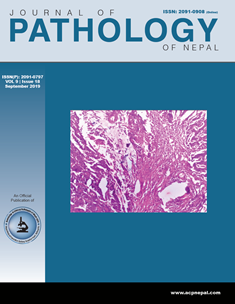Clinico-histopathological correlation of pigmented skin lesions: A hospital based study at BPKIHS
DOI:
https://doi.org/10.3126/jpn.v9i2.24080Keywords:
Melanoma, Melanocytic, Nevi, Nonmelanocytic, Pigmented skin lesionAbstract
Background: Pigmented skin lesions refers to melanocytic as well as nonmelanocytic lesions. Pigmentation is not just a cosmetic deformity but can also reflect underlying benign pathology as nevi or malignant lesions as melanoma. With this study we intend to evaluate the spectrum of pigmented skin lesions and to correlate the clinical diagnosis with the histological diagnosis.
Materials and Methods: This is a hospital based cross sectional descriptive study where clinicohistopathological evaluation of 46 cases of pigmented skin lesions were analyzed on paraffin embedded tissue sections for a duration of 1 year at the Department of Pathology, B. P. Koirala Institute of Health Sciences.
Results: Out of the 46 cases evaluated there were 32 cases of melanocytic lesions comprising of benign melanocytic nevi (n=27), malignant melanoma (n=5) and 14 cases of nonmelanocytic lesions including basal cell carcinoma and seborrhoeic keratosis (5 cases each). Angiokeratoma (n=1), sebaceous hyperplasia (n=1), trichoepitheloma (n=1) and venous haemangioma (n=1). The age range was from 8-83 years with slight female predominance (52.2%) and the most common site involved was head and neck (58.7%). 76.1% of the patients belonged to the Terai region. Clinicohistopathological correlation showed positive correlation in 26 cases (56.5%) and negative correlation in 20 cases (43.5%).
Conclusions: Pigmented skin lesions are common presenting problem, while majority are benign a small minority can be malignant. So, clinically pigmented skin lesions should be submitted for pathological examination in order not to miss a small percentage of malignant tumors and to differentiate melanocytic lesions from its nonmelanocytic mimickers.
Downloads
Downloads
Published
How to Cite
Issue
Section
License
This license enables reusers to distribute, remix, adapt, and build upon the material in any medium or format, so long as attribution is given to the creator. The license allows for commercial use.




